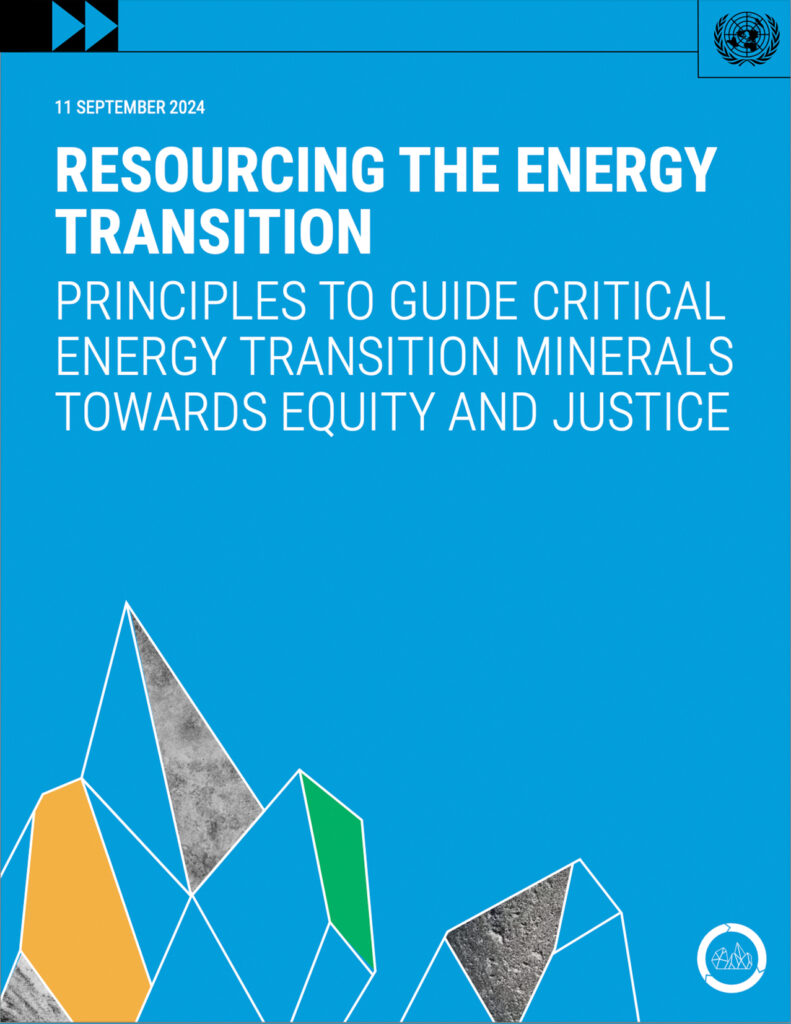United Nations-Convened Guiding Principles to Guide Global Energy Transition: What does this mean for the Cobalt Industry?
In a world increasingly oriented towards renewable energy, the significance of critical minerals such as cobalt cannot be overstated. Driven by global commitments to achieve net-zero, global annual demand for cobalt from batteries is set to grow more than three-fold between 2020 and 2050, reaching 250kiltons by 2050.
Recognizing this, the UN Secretary-General recently convened the Panel on Critical Energy Transition Minerals—composed of governments, intergovernmental and international organizations, industry and civil society— to design a cohesive framework aimed at building trust, guiding the just transition and accelerating the race to renewables.
This initiative has recently released a set of Guiding Principles and recommendations for governments, industry and other stakeholders that echo the importance of safeguarding human rights, respecting communities and the environment while navigating the complex terrain of mineral value chains.
Understanding the Scope of Critical Minerals
The panel’s report explicitly lists the critical minerals—cobalt, lithium, copper, nickel, graphite, rare earth elements (REEs), and aluminum—necessary for renewable energy technologies. These minerals are not just raw materials; they are the building blocks of the clean-energy transition, fundamental to electric vehicles, battery storage, and solar panels. As technological advancements drive up demand for these resources, the spotlight turns to the regions where they are extracted, notably those with weaker governance frameworks.
Key Principles for a Just Transition
Addressing how minerals are sourced in an ethical manner, the Panel proposes seven voluntary Guiding Principles aimed at bringing equity and justice to the fore of the transition process:
PRINCIPLE 1: Human rights must be at the core of all mineral value chains.
PRINCIPLE 2: The integrity of the planet, its environment and biodiversity must be safeguarded.
PRINCIPLE 3: Justice and equity must underpin mineral value chains.
PRINCIPLE 4: Development must be fostered through benefit sharing, value addition and economic diversification.
PRINCIPLE 5: Investments, finance and trade must be responsible and fair.
PRINCIPLE 6: Transparency, accountability and anti-corruption measures are necessary to ensure good governance.
PRINCIPLE 7: Multilateral and international cooperation must underpin global action and promote peace and security.
These Principles not only reflect the need for accountability, but also signal a decisive shift toward a new paradigm that prioritizes the rights of Indigenous Peoples and the well-being of communities involved in mineral extraction.
Implications for the Cobalt Value Chain
For companies operating in the cobalt sector, the implications of these Guiding Principles are profound. As the demand for cobalt continues to surge, with its pivotal role in electric vehicle batteries, companies will continue to face scrutiny regarding their extraction and sourcing practices. The Panel emphasizes that “there must be no regression in the hard-won individual and collective rights of Indigenous Peoples,” a reminder that any missteps in labour rights or environmental stewardship will be met with greater backlash from consumers and advocacy groups alike.
In light of this intensified scrutiny, businesses involved in the cobalt value chain must stay steady on their course of adopting robust and inclusive environmental and human rights due diligence processes aligned with international authoritative frameworks. This includes continuing to work towards ensuring the transparency of their supply chains and developing robust accountability measures that align with the Principles set forth by the Panel, such as through the Global Battery Alliance’s Battery Passport. It will also require continued engagement in multistakeholder initiatives, like the Fair Cobalt Alliance, that seek to strengthen and professionalise the artisanal cobalt mining sector in the Democratic Republic of the Congo (DRC) and to contribute to local economic development at large.
Collaborating with international organizations, like the UN Human Rights Council and the International Labour Organization will also be crucial as these institutions integrate the Principles into their oversight mechanisms.
Moving Forward: A Call to Action
As we move forward, it's vital for all stakeholders—governments, businesses, civil society, and international organizations—to come together to embrace this call to action. The decisions made today will shape the future of how we extract, produce, and utilize critical minerals. A principled approach grounded in equity, justice, and respect for human rights will not only ensure sustainable practices in mineral value chains but also foster a brighter, more equitable energy future for generations to come.
In conclusion, the UN Secretary-General’s Panel on Critical Energy Transition Minerals has set forth a crucial initiative that invites all entities involved to rethink their approach to cobalt and other critical minerals. The shift towards renewable energy offers immense potential, but it must happen responsibly to ensure that the benefits are equitably shared and human rights are upheld. The journey towards a sustainable energy future depends on our collective effort to uphold these Guiding Principles and create a more just and equitable world.
By Susannah McLaren, Head of Responsible Sourcing and Sustainability, Cobalt Institute

